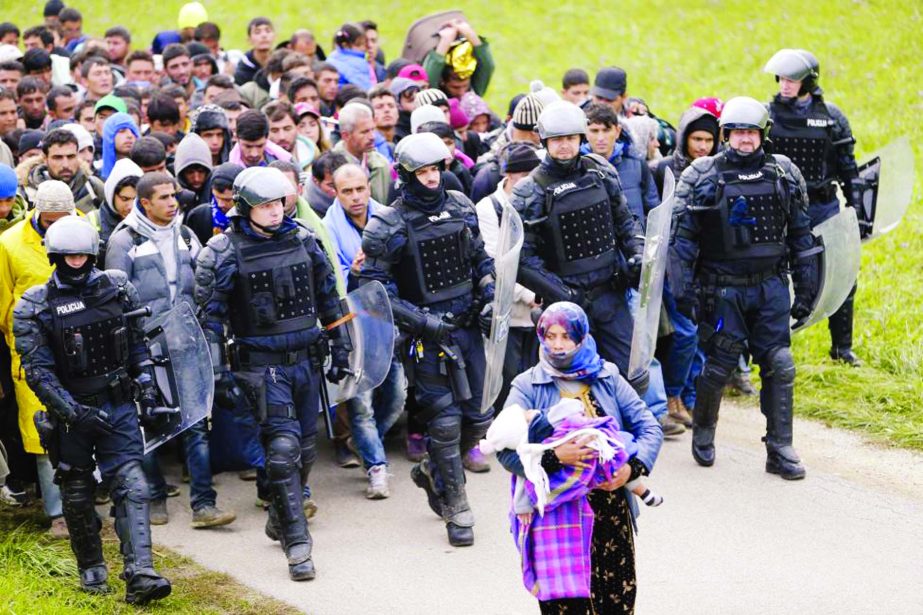
Reuters, BERLIN :
Germany is introducing measures to tackle its refugee crisis earlier than previously expected, a top government official said on Friday, allowing accelerated deportation procedures to begin as early as next week.
Germany expects a record influx of more than 800,000 migrants this year, by far the most in the European Union. With the new measures, Berlin is aiming to cope better with the unprecedented number of arrivals and to stem the influx.
The tighter rules aim to speed up asylum and extradition procedures for migrants from southeastern Europe, in order to focus on refugees from war-torn countries such as Syria, Iraq and Afghanistan.
Peter Altmaier, Chancellor Angela Merkel’s chief of staff, said the new measures could now be expected to come into effect before a previously foreseen start date of Nov. 1.
“That would be a good signal,” he told ARD television. “We want to get better and faster this year at the deportation of rejected applicants who have no claim to remain here,” added Altmaier, who Merkel appointed earlier this month to oversee her government’s handling of the refugee crisis.
Support for Merkel’s conservatives has fallen due to concern over the refugee crisis. Many Germans feel the country cannot cope with the record influx. A poll for ARD showed three-quarters of Germans expect the influx of refugees to change German society.
Several European leaders are due to meet on Sunday to tackle the migrant crisis in the western Balkans as thousands trying to reach Germany are trapped in deteriorating conditions.
Hungary has responded to the largest migration wave Europe has seen since World War Two by building a steel fence along its borders with Serbia and Croatia, a step both welcomed and criticised by various leaders around Europe.
“The more fences are erected the greater the misery,” Altmaier said. “Europe must see to it that this movement and this influx is orderly and structured.” The head of Germany’s police trade union, Rainer Wendt, said the crisis was stretching police resources thin. “I have personally told the chancellor: we can’t be in two places at once,” Wendt told newspaper Die Welt.
Germany is introducing measures to tackle its refugee crisis earlier than previously expected, a top government official said on Friday, allowing accelerated deportation procedures to begin as early as next week.
Germany expects a record influx of more than 800,000 migrants this year, by far the most in the European Union. With the new measures, Berlin is aiming to cope better with the unprecedented number of arrivals and to stem the influx.
The tighter rules aim to speed up asylum and extradition procedures for migrants from southeastern Europe, in order to focus on refugees from war-torn countries such as Syria, Iraq and Afghanistan.
Peter Altmaier, Chancellor Angela Merkel’s chief of staff, said the new measures could now be expected to come into effect before a previously foreseen start date of Nov. 1.
“That would be a good signal,” he told ARD television. “We want to get better and faster this year at the deportation of rejected applicants who have no claim to remain here,” added Altmaier, who Merkel appointed earlier this month to oversee her government’s handling of the refugee crisis.
Support for Merkel’s conservatives has fallen due to concern over the refugee crisis. Many Germans feel the country cannot cope with the record influx. A poll for ARD showed three-quarters of Germans expect the influx of refugees to change German society.
Several European leaders are due to meet on Sunday to tackle the migrant crisis in the western Balkans as thousands trying to reach Germany are trapped in deteriorating conditions.
Hungary has responded to the largest migration wave Europe has seen since World War Two by building a steel fence along its borders with Serbia and Croatia, a step both welcomed and criticised by various leaders around Europe.
“The more fences are erected the greater the misery,” Altmaier said. “Europe must see to it that this movement and this influx is orderly and structured.” The head of Germany’s police trade union, Rainer Wendt, said the crisis was stretching police resources thin. “I have personally told the chancellor: we can’t be in two places at once,” Wendt told newspaper Die Welt.

